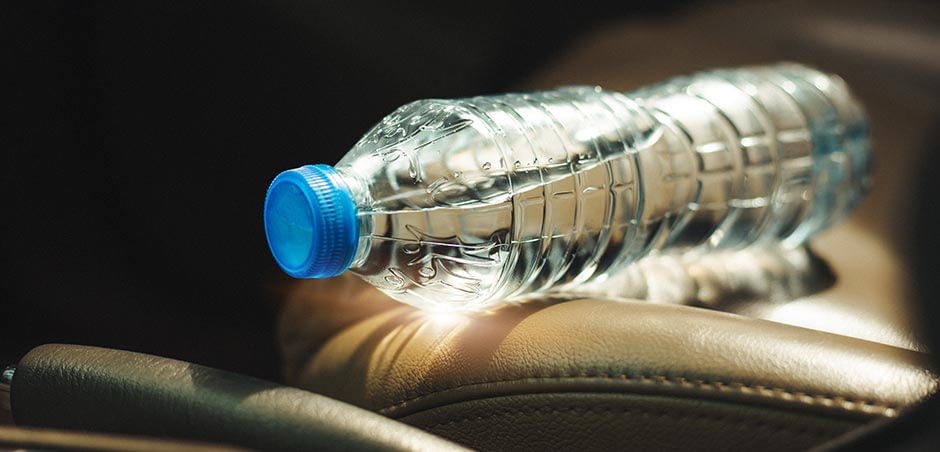
Sometimes, it’s easy to feel like you’re living out of your car. You drive to and from work. Shuttle the kids around. Get groceries. Run errands… The list goes on.
With all this busyness, your car can become a catch-all for everything you need throughout the day. But using your car as a temporary storage space is a bad habit to get into. Not only can it leave you susceptible to a car break-in, but extreme temperatures (both hot and cold) can be bad for your stuff, too.
To help you protect your vehicle (and the things inside it), here’s our list of 19 things you should never leave in your car.
- Electronics. Not only are expensive electronics an invitation to thieves – but the information they store is often more valuable than the device itself.
- Water bottles. On a hot day, the high temperatures in your car can cause chemicals from the plastic bottle to leach into the water. The biggest offender is bisphenol A (BPA), which has been linked to a range of health problems – including diabetes and cardiovascular disease.
- Medication. Did you know that fluctuating temperatures inside your car could impact the effectiveness of your prescription drugs? According to Baystate Health, most medicines should be stored at 59 to 77 degrees Fahrenheit in a cool, dry place. When your medications are stored outside that range in hot or freezing temperatures, the chemical properties of certain drugs can change, potentially making them less effective.
- Purse or wallet. Obviously, leaving a purse or wallet in a visible location can attract the wrong type of attention to your parked car. But even when stowed out of sight, it’s unwise to leave a purse or wallet in your car. Not only does it contain cash and credit cards, but a thief could also gain access to your driver’s license and other important personal data. See our related post: How to Freeze Your Credit (and When You Might Need To)
- Important documents. Speaking of personal data, any documents or forms that contain sensitive information should never be left in your car. That includes things like tax forms, financial statements, school transcripts or your passport. Information from these documents could be used by a thief to commit fraud or identity theft. (For an extra layer of protection, ask your local ERIE agent about Identity Theft Recovery Coverage.)
- Wine. Wine enthusiasts go to great lengths to store their vino at the perfect temperature and humidity. Leaving a bottle of wine in a hot car is pretty much the exact opposite of that. Not only can extreme heat produce off-flavors in the wine, but heat can also cause the air in the bottle to expand – pushing out the cork enough to contaminate the liquid inside.
- Canned beverages. Extreme hot and cold temperatures could cause the cans to explode. And trust us – your car will never be the same after cleaning up the sticky aftermath of that soda bomb.
- Pets. This one should be obvious, but it’s still worth mentioning. Never leave your pet alone inside a parked car. Time passes faster than you realize, and on a hot day, car temperatures can quickly climb to well over 115 degrees Fahrenheit, putting your pet’s life in danger. (See also: Protect Your Pets from Hot Cars)
- Groceries. According to the U.S. Department of Agriculture (USDA), refrigerated foods should never be left out for more than two hours. And if the temperature is above 90 degrees Fahrenheit, that time is reduced to one hour. Leaving perishable food in your car beyond these limits can promote the spread of harmful bacteria. The takeaway: On a hot day, keep your food safe by heading straight home after your trip to the grocery store.
- Aerosol cans. A hot car is no place to leave an aerosol can. Whether it’s spray paint, deodorant, hairspray or a household cleaner, these pressurized cans can explode in temperatures above 120 F – which is definitely possible to achieve inside your car on a warm summer day.
- Lighters. Similar to aerosol cans, cigarette lighters can also leak or explode in high temperatures. The resulting explosion could even start a fire.
- Plants. Leaving a plant inside your car for too long can lead to dehydration. And fluctuating temperatures can stress – or even kill – the hardiest houseplants.
- Art supplies. If you’re a parent, you’ve likely experienced the joy of scraping melted crayons off a car seat. It doesn’t take much heat for art supplies like crayons and pastels to soften and melt – leaving a colorful mess in their wake.
- Cosmetics. You’ve invested a lot of money in that bag of makeup. So don’t ruin it by leaving it in your car. Just like crayons, that new lipstick can also melt into a waxy puddle in your hot car. And other cosmetics, like mascara, can become unusable if they freeze – even after they thaw back out.
- Cash. Leaving cash visible in your car is asking for trouble. Even if it’s only a few dollars, or some spare change in the cupholder, you may be surprised how little it takes to convince a would-be thief to break your car window. (Read our related post on what to do if your car is broken into.)
- Musical instruments. Storing a wooden instrument, like a guitar or violin, in your car could result in permanent damage. That’s because rapid changes in temperature and humidity can cause the delicate wood used in the instrument to warp, crack or split.
- Glasses. Did you know high and low temperatures can affect the frames of your glasses and sunglasses? In a hot car, plastic frames can warp and bend. And when it’s freezing out, the plastic can become brittle – making it easier to accidentally break them.
- Sunscreen. It’s nice to have some sunblock handy at a moment’s notice. But keeping your bottle of sunscreen in a hot car can cause the protective chemicals to break down – reducing its effectiveness.
- Batteries. Extreme temperatures aren’t good for batteries, either. High temperatures can cause your sealed batteries to leak. And low temperatures can reduce the energy storage capacity of a battery.
We’ve got your back
Life is full of unexpected moments. When something you value has been damaged or lost, filing an auto insurance claim shouldn’t add to the stress.
At ERIE, hassle-free claims service and fair assessments are what we’re all about. To learn more about how auto insurance from ERIE can protect you and your car, get in touch with a local independent agent near you.

A better insurance experience starts with ERIE.
Haven’t heard of us? Erie Insurance started with humble beginnings in 1925 with a mission to emphasize customer service above all else. Though we’ve grown to reach the Fortune 500 list, we still haven’t lost the human touch.
Contact Mitros Insurance today to experience the ERIE difference for yourself.
